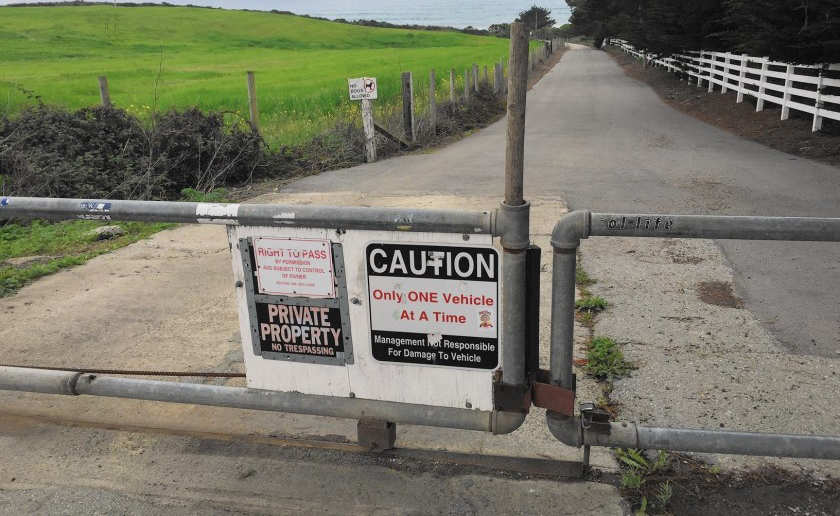
Beaches. Surfers. Fabulous wealth. Land squabbles. Silicon Valley entrepreneurs. Outrage. Random accusations of Communism.
I don’t want to alarm anyone, but this may be our most “California” story yet.
It all started in 2008, when Vinod Khosla, the billionaire co-founder of Sun Microsystems, purchased 89 acres south of Half Moon Bay, including Martin’s Beach, for $32.5 million. The Deeneys, the previous owners, managed restrooms, parking, and a store on the premises, allowing the public to come and go. Khosla found the revenue generated by these facilities too low. Understandably unwilling to operate at a loss, he closed off the path leading to the beach.
That’s when the lawsuits started pouring in.
In 2009, after he posted no trespassing signs and made alterations to the landscape without a permit, local authorities started sniffing around, and Khosla sued them for interference in his property rights. This was dismissed by a county Superior Court judge, however, as Khosla needed to actually apply for a permit before being able to sue.
The case lay dormant until October 2012, when a group of surfers walked past the locked gate and was arrested for trespassing. A couple of the surfers created the Friends of Martin’s Beach, saying the beach belonged to everybody and that Khosla was breaking the law by cutting off access.
Two factions formed. On one side, we have the Friends, another group called the Surfriders, local and state authorities, and most of the general public. On the other, we have Khosla and, presumably, most Californian oceanfront owners. The debate: is Martin’s Beach public, or private? And, by extension, what does that make all the other beaches attached to private property?
Steve Padilla, chair of the Coastal Commission (remember them from Coast Clear?), says the case “goes to the heart of California’s public access mandate,” and could set a dangerous precedent. Meanwhile, Dori Yob Kilmer, one of Khosla’s attorneys, says activist groups and the state are in cahoots to rob her client of his property. “While such tactics are commonplace in communist systems, they have never been tolerated in the American system.”
When someone lobs out the C-word, you know it’s serious. So, who’s right?
Since the 1976 Coastal Act declared the beach is for everyone, private efforts to keep the public off the sand have slowly been eroded. The pro-public group (as it were) says that the beach and the road leading to it have historically been used by people, citing a common law doctrine known as “implied dedication.” Martin’s Beach can only reasonably be accessed through Martin’s Beach Road from Highway 1. Due to historic legal decisions and long-time use by the public, the argument is that things should remain as they are.
The pro-property group (as it were) make a pretty simple claim: Khosla bought the property, the beach is included, and he’s free to do what he wants. The previous owners, the Deeneys, operated a business on the beach and charged admission, so it wasn’t ever the truly “public” beach it’s now being touted as. Consequently, Khosla has no duty to open the place up.
On the face of it, you could make a pretty good case for either opinion. What does the evidence say?
Well, the Coastal Commission’s spent the past few years getting written accounts, pictures, and news articles from over 200 people to demonstrate public use dating back to the 19th century. The beach was touted in state guidebooks and further promoted by a billboard beckoning people driving down Highway 1 to “Enter.” Crucially, the lawsuit filed by the Commission specifically says “the previous owners knew of that public use and did not interfere with such use” – meaning that even if they could have tried to stop people from going to Martin’s Beach, they chose not to.
The pro-property side points out that the previous owners closed the gate too, from time to time, and altered the landscape without interference from the Commission. They note that similar beach arrangements in Santa Cruz and San Gregorio haven’t been the subject of nearly as much scrutiny as Martin’s Beach.
Courts have tended to side with the pro-public gang: apart from the 1976 Coastal Act, a 2013 Superior Court decision would have Khosla keeping the gate open “at least as frequently” as the previous owners. Khosla’s failure to secure a development permit before restricting beach access was also judged illegal, and the Legislature passed a bill ordering the State Lands Commission to negotiate with Khosla to acquire a public easement within a year. If negotiations failed, the SLC was authorized to obtain the land through condemnation proceedings. The Supreme Court also declined to hear the case when the pro-property front tried to escalate.
Still in 2013, however, San Mateo County Superior Judge Gerald Buchwald concluded that there was no right of access because the property was subject to the 1848 Treaty of Guadalupe Hidalgo, which ended the Mexican-American War and recognized Mexican land grants. Martin’s Beach had been privately owned before the existence of public access laws, and the Californian state registered no interest in the land – probably because it wouldn’t be a state for another 2 years. Precedent’s obviously crucial, but I don’t think it’s controversial to say that society and its priorities were pretty different back then. Y’know, California had a population of 92,000, slavery was legal, and nobody knew what a germ was. Seems a little contentious to apply those norms to the modern day. But hey.
Martin’s Beach is just one in a line of cases of rich and famous people asserting beach property rights. There was music producer David Geffen in Malibu, who fought for over 20 years before conceding, and there’s Mark Zuckerberg’s situation in Hawaii. What makes it interesting, apart from possible repercussions on other oceanfront property, is the man behind the controversy: Vinod Khosla.
He’d mainly been known for his clean tech investments and enjoyed a pretty positive image, even being hailed as an eco-hero. That’s all been superseded by Khosla fighting this case so hard despite not living on the property (which is his right, obviously, but the average Joe is none too pleased), writing a long column in the SF Chronicle where he denies the beach was ever public, offering to sell a small section of the property to allow access to the beach for $30 million – only a lick under what he paid for the entire 89-acre property – and saying things like:
“My view is, absolutely we should increase coastal access when we can, but we should also protect private property rights. This is about principle.”
Despite his progressive image, Khosla has also hired attorney Paul Clement to lead his legal team. Clement served as U.S. solicitor general under President Bush Jr. and clerked under Justice Scalia. This is a strange option for someone who, presumably, is part of the socially liberal SF tech crowd – while it may make sense for the case, it raises a few eyebrows where Khosla’s overall image is concerned.
One article suggests Khosla donate Martin’s Beach to the state in exchange for tax credit, in keeping with his pledge to give up half his wealth to charity, or negotiate a price for beach access with the Lands Commission. It doesn’t seem like he’s interested in either. He’s keeping his cards close to his chest.
Any way you slice it, who you side with will really depend on how you decide to interpret the law and where your pre-existing sympathies lie. The most recent court decision, dating back to January 6 of this year, weighs the odds to the pro-public side, but who knows what else will crop up. Maybe something dating back to the Portuguese exploration of the coast in the 1540s.
My suggestion to the pro-public crowd: an appeal to pre-agrarian society to assert that land ownership is unnatural and counter to human nature. First one to work the argument back to the Mesozoic wins. You can have that one for free.

